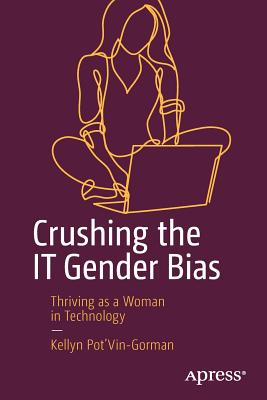Cracking the Digital Ceiling: Women in Computing Around the World
暫譯: 破解數位天花板:全球女性在計算機領域的角色
Frieze, Carol, Quesenberry, Jeria L.
- 出版商: Cambridge
- 出版日期: 2019-12-12
- 售價: $1,590
- 貴賓價: 9.5 折 $1,511
- 語言: 英文
- 頁數: 356
- 裝訂: Quality Paper - also called trade paper
- ISBN: 1108740073
- ISBN-13: 9781108740074
海外代購書籍(需單獨結帳)
商品描述
Is computing just for men? Are men and women suited to different careers? This collection of global perspectives challenges these commonly held western views, perpetuated as explanations for women's low participation in computing. By providing an insider look at how different cultures worldwide impact the experiences of women in computing, the book introduces readers to theories and evidence that support the need to turn to environmental factors, rather than innate potential, to understand what determines women's participation in this growing field. This wakeup call to examine the obstacles and catalysts within various cultures and environments will help those interested in improving the situation understand where they might look to make changes that could impact women's participation in their classrooms, companies, and administrations. Computer scientists, STEM educators, students of all disciplines, professionals in the tech industry, leaders in gender equity, anthropologists, and policy makers will all benefit from reading this book.
商品描述(中文翻譯)
計算機科學是否只是男性的領域?男性和女性是否適合不同的職業?這本書的全球觀點挑戰了這些普遍存在的西方觀念,這些觀念被用來解釋女性在計算機領域參與度低的原因。通過提供對不同文化如何影響女性在計算機領域經歷的內部觀察,這本書向讀者介紹了支持轉向環境因素而非天生潛力的理論和證據,以理解什麼決定了女性在這個不斷增長的領域中的參與。這是一個喚醒的呼籲,促使人們檢視各種文化和環境中的障礙和催化劑,將幫助那些希望改善現狀的人了解他們可以在哪裡尋找改變,以影響女性在教室、公司和行政機構中的參與。計算機科學家、STEM 教育工作者、各學科的學生、科技行業的專業人士、性別平等的領導者、人類學家和政策制定者都將從閱讀這本書中受益。
作者簡介
Carol Frieze, Carnegie Mellon University, Pennsylvania
Carol Frieze works on diversity and inclusion in Carnegie Mellon's School of Computer Science. She focuses on culture and broadening participation in computing. She is co-author of Kicking Butt in Computer Science: Women in Computing at Carnegie Mellon University (2015). Frieze is winner of the 2016 AccessComputing Capacity Building Award and the 2017 winner of the Computing Research Association's A. Nico Habermann Award.
Jeria L. Quesenberry, Carnegie Mellon University, Pennsylvania
Jeria L. Quesenberry is an associate teaching professor of information systems at Carnegie Mellon University. Her research interests include cultural influences on IT students and professionals, social inclusion, and broadening participation. She is co-author of Kicking Butt in Computer Science: Women in Computing at Carnegie Mellon University (2015).
作者簡介(中文翻譯)
卡羅爾·弗里茲,卡內基梅隆大學,賓夕法尼亞州
卡羅爾·弗里茲在卡內基梅隆大學的計算機科學學院從事多樣性和包容性工作。她專注於文化以及擴大計算領域的參與。她是《在計算機科學中大展身手:卡內基梅隆大學的女性計算者》(2015)的共同作者。弗里茲獲得了2016年AccessComputing能力建設獎和2017年計算研究協會的A. Nico Habermann獎。
傑里亞·L·奎森貝里,卡內基梅隆大學,賓夕法尼亞州
傑里亞·L·奎森貝里是卡內基梅隆大學信息系統的副教授。她的研究興趣包括文化對IT學生和專業人士的影響、社會包容性以及擴大參與。她是《在計算機科學中大展身手:卡內基梅隆大學的女性計算者》(2015)的共同作者。
目錄大綱
Introduction Carol Frieze and Jeria L. Quesenberry
Part I. Global Perspectives:
1. An inegalitarian paradox Tiffany Chow and Maria Charles
2. Perspectives from the UNESCO Science Report 2015 Toward 2030 Sophia Huyer
3. Field studies of women in Europe, North America, Africa and the Asia-Pacific Eileen M. Trauth
Part II. Regional Perspectives:
4. Socio-cultural complexities of Latin American and Caribbean women in computing Palma Buttles and Fred Valdez, Jr
5. A gender perspective on computer science education in Israel Orit Hazzan, Efrat Nativ-Ronen and Tatiana Umansky
6. Factors influencing women's ability to enter the IT workforce Sophia Huyer and Nancy J. Hafkin
Part III. Cultural Perspectives from the United States of America and Europe:
7. Against all odds Monica Adya
8. Cultures and context in tech Sally Applin
9. Perspectives of women with disabilities in computing Brianna Blaser, Cynthia Bennett, Richard Ladner, Sheryl Burgstahler and Jennifer Mankoff
10. An interview with Dr Sue Black, OBE, computer scientist and computing evangelist Sue Black
11. An overview of the Swedish educational system with a focus on women in computer science Sinna Lindquist and Ingrid Melinder
12. Portugal: perspective on women in computing Arminda Guerra Lopes
13. Women in computing: the situation in Russia Evgeniy K. Khenner
Part IV. Cultural Perspectives from Asia-Pacific:
14. More Chinese women needed to hold up half the computing sky Ming Zhang and Yichun Yin
15. How the perception of young Malaysians towards science and mathematics influences their decision to study computer science Mazliza Othman and Rodziah Latih
16. Of pedestals and professions: female software engineers in Tamil cinema Joyojeet Pal
17. Women in computing education: a western or a global problem? Lessons from India Roli Varma
18. Challenging attitudes and disrupting stereotypes of gender and computing in Australia Catherine Lang
Conclusion.
目錄大綱(中文翻譯)
Introduction Carol Frieze and Jeria L. Quesenberry
Part I. Global Perspectives:
1. An inegalitarian paradox Tiffany Chow and Maria Charles
2. Perspectives from the UNESCO Science Report 2015 Toward 2030 Sophia Huyer
3. Field studies of women in Europe, North America, Africa and the Asia-Pacific Eileen M. Trauth
Part II. Regional Perspectives:
4. Socio-cultural complexities of Latin American and Caribbean women in computing Palma Buttles and Fred Valdez, Jr
5. A gender perspective on computer science education in Israel Orit Hazzan, Efrat Nativ-Ronen and Tatiana Umansky
6. Factors influencing women's ability to enter the IT workforce Sophia Huyer and Nancy J. Hafkin
Part III. Cultural Perspectives from the United States of America and Europe:
7. Against all odds Monica Adya
8. Cultures and context in tech Sally Applin
9. Perspectives of women with disabilities in computing Brianna Blaser, Cynthia Bennett, Richard Ladner, Sheryl Burgstahler and Jennifer Mankoff
10. An interview with Dr Sue Black, OBE, computer scientist and computing evangelist Sue Black
11. An overview of the Swedish educational system with a focus on women in computer science Sinna Lindquist and Ingrid Melinder
12. Portugal: perspective on women in computing Arminda Guerra Lopes
13. Women in computing: the situation in Russia Evgeniy K. Khenner
Part IV. Cultural Perspectives from Asia-Pacific:
14. More Chinese women needed to hold up half the computing sky Ming Zhang and Yichun Yin
15. How the perception of young Malaysians towards science and mathematics influences their decision to study computer science Mazliza Othman and Rodziah Latih
16. Of pedestals and professions: female software engineers in Tamil cinema Joyojeet Pal
17. Women in computing education: a western or a global problem? Lessons from India Roli Varma
18. Challenging attitudes and disrupting stereotypes of gender and computing in Australia Catherine Lang
Conclusion.











